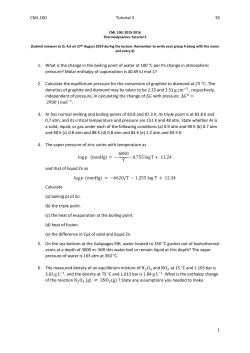
Notes Gases 10.1 Properties of Gases
www.hschemsolutions.com Properties of Gases • Expand to fill the volume of the container they occupy Gases 10.1 es • Form homogeneous mixtures Pressure Kinetic Molecular Theory Boyle’s Law Charles’ Law The Combined Gas Law N ot • Low density • Highly compressible ts 'L ec tu re • Exert a pressure Gases Exert Pressures in all Directions Pressure N Force Pressure = Area m2 1 atm 1 atm 1 atm 1 atm 1 atm ud Gases exert pressure by bouncing off surfaces en Pa 1 atm 1 atm • Gas particles are evenly distributed in a container. 1 atm 1 atm 1 atm St • The same number smash off every cm2 per unit of time. - Each collision exerts a force. 1 atm 1 atm 1 atm 1 atm of 1 atm C op y • The pressure is constant at constant temperatures. m pl e Sucking gas particles out of a can Atmospheric Pressure (1 atm) Vacuum pump on Open ended tube 1 atm = 760 mm Hg Vacuum (0 atm) Atmospheric Pressure (1 atm) Pinside = Poutside Pinside < Poutside 760 mm Sa Vacuum pump off Barometers Measure Gas Pressure Mercury - Hg(l) © 2009 High School Chem Solutions. All rights reserved. 1 www.hschemsolutions.com Kinetic Energy of Gas Molecules Notes on Kinetic Molecular Theory fast • Rotational Energy slow • Vibrational Energy N ot KEinitial = es • Collisions experienced by gas particles are elastic. - Kinetic Energy is conserved. • Translational Energy – gas molecules move through space in straight lines. KEfinal ΣKEinitial = ΣKEfinal slow Most of a gas particle’s KE is related to its translational velocity ts 'L ec tu re fast Boyle’s Law Pressure – Volume Relationship en St ud Twice the Pressure V1P1 = V2P2 Pressure Relationship between Pressure and Volume of Volume is inversely proportional to pressure. Half the Volume C op y Volume Sa Relationship between Temperature and Volume V1 T1 = V2 T2 Volume is proportional to temperature. You must use absolute temperature (K)! Relating Volume and Temperature 50 Volume (cm3) m pl e Charles’ Law 0 0 573 Temperature (K) © 2009 High School Chem Solutions. All rights reserved. 2 www.hschemsolutions.com Temperature – Volume Relationship The Combined Gas Law 500 K P1V1 T1 250 K N ot Average KE = ½ x P2V2 T2 = es Average KE = x You must use absolute temperature (K)! re Half the Volume ts 'L ec tu Volume Ex1) Combined Gas Law (cont.) PV PV 1 1 = 2 2 T1 T2 C op y of St ud Ex1) A cylinder of gas is kept at a constant volume, as the temperature increases from 24.1oC to 326.4oC. If the initial pressure was 1.10 atm, what is the final pressure in mm Hg? en Ex1) Combined Gas Law m pl e Ex2) Combined Gas Law Sa Ex2) A cylinder of gas is kept at a constant pressure, as the volume decreases from 1.150 L to 0.860 L. If the initial temperature was 21.8oC, what is the final temperature? Ex2) Combined Gas Law (cont.) PV PV 1 1 = 2 2 T1 T2 © 2009 High School Chem Solutions. All rights reserved. 3
© Copyright 2025





















